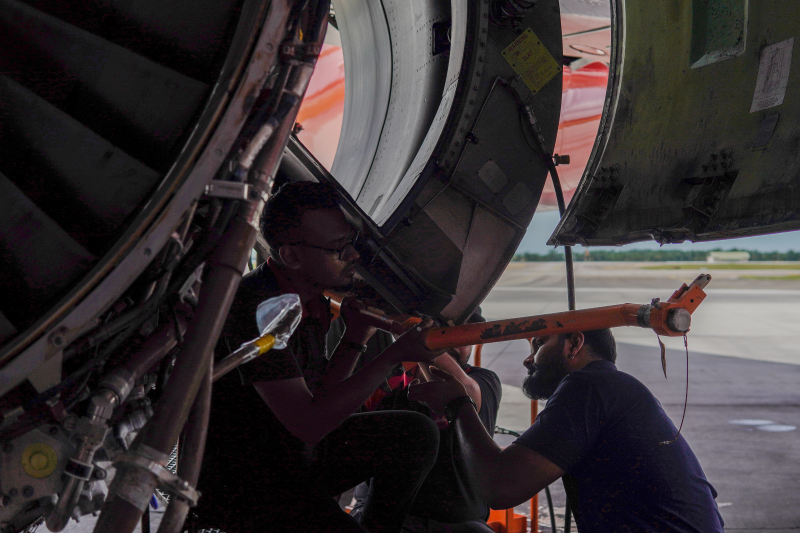
The engineering subsidiary created by AirAsia parent Capital A is taking over an increasing share of the group’s heavy maintenance needs, as the unit develops its base maintenance capabilities and capacity.
Asia Digital Engineering (ADE) is now handling about 40% of AirAsia Group’s heavy maintenance, said Adnan Mansur, ADE’s head of digital and innovation services. The intention is to eventually take over all of the group’s base maintenance requirements as well as pursue third-party work, Mansur said May 18 on the sidelines of Aviation Week’s recent MRO Australasia conference in Brisbane, Australia.
The subsidiary is handling about 6-7 aircraft per month for heavy maintenance visits up to C-checks, Mansur said. AirAsia is still contracting out the remainder of its maintenance needs to other providers.
ADE was established in September 2020, using AirAsia’s engineering division as its foundation. Before then, the engineering operation focused on line maintenance, but ADE gained its heavy maintenance certification from Malaysian regulators in May 2021.
The company is building a new hangar at Kuala Lumpur International Airport (KLIA) to increase its base maintenance capacity. The hangar, which will be able to accommodate 14 narrowbodies at once, is due to be operational in the third quarter of 2024, Mansur said.
In the meantime, ADE has a smaller hangar at KLIA, and is leasing hangar space at Malaysia’s Subang and Johor Bahru airports. These facilities combined give ADE seven aircraft maintenance lines. The company has not yet decided if it will retain the leased facilities once its 14-line hangar opens, Mansur said.
In addition to more hangar space, ADE is also upskilling and boosting its workforce to support its base maintenance plans, he added.
When ADE was established, one of the main goals was to create a new revenue stream for the group by attracting third-party maintenance, Mansur said. The company aims to have third-party work comprise 30% of its revenue within five years. This will also help ADE in the longer term, as it will not have to rely solely on AirAsia for base maintenance work, Mansur noted.
Another important facet of ADE’s business plan is to develop digital capabilities that it can initially use in its own operations and then market to other companies.
ADE has approvals for line maintenance work from multiple jurisdictions. It also has approvals for heavy maintenance on the Airbus A320ceo and A320neo families of aircraft. The company is working on gaining approval for A330s, which are operated by Capital A group member AirAsia X.
One of ADE’s priorities is gaining approvals from the European Union Aviation Safety Agency (EASA), initially for line maintenance. This process is underway, and EASA representatives have visited ADE’s facilities.
EASA certification could potentially occur as early as the third quarter of 2023, Mansur said.





